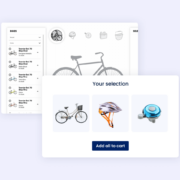Too much of a good thing is a bad thing.
It sounds cliche, doesn’t it?
Well, it isn’t—especially when it comes to your customers and the number of options they have.
Many eCommerce businesses struggle with abandoned carts.
The truth?
Too many options in your digital store can affect your eCommerce sales conversions.
Most eCommerce business owners assume that “more is better” and “customers want choices.”
The reality is that more isn’t always better.
A psychology professor, Barry Schwartz, confirms this in the Harvard Business Review.
So what options do eCommerce businesses have—without losing their competitive edge?
You guessed it.
Digital stores can take advantage of technology to help their customers find what they want without getting overwhelmed.
One option for eCommerce businesses is a product finder vs. product quiz.
Which option makes more sense for your eCommerce business?
Let’s find out.
But first, let’s understand what exactly these tools are.
Product Finder vs Product Quiz: What are They —exactly?
Differentiating product finders and product quizzes can be confusing.
To understand the differences, eCommerce business owners need to know how these tools work.
Product finders are also known as digital assistants.
So, what’s the definition?
A digital assistant is a computer program designed to assist users by answering questions and performing various tasks.
Product finders help customers find what they’re looking for in an eCommerce store and match them to the right products for their needs and wants.
Product finders use artificial intelligence (AI), machine learning, and natural language processing and understanding to have a conversation with the people who use it.
So, what are product quizzes?
Similar to a regular quiz, product quizzes ask users a series of questions about their product preferences.
In contrast to regular quizzes, the users’ answers lead to a customized results page. The customized page invites the quiz-takers to make a purchase—or save the recommended products for later.
Product quizzes aim to guide the buyer through the sales funnel.
How do they achieve this?
By asking users their preferences, these quizzes narrow down the range of product choices.
The result?
Customers don’t need to spend too much time browsing for products—and find the products they want faster.
Product Finder Vs. Product Quiz—Just another Fad?
The reality is that whether you’re working with product finders or product quizzes—customers want easy access.
Ecommerce businesses should always be optimized for quick shopping experiences. Optimization helps customers find what they need within the fastest possible route.
If they can’t find what they need, they’ll move on.
What’s more?
Ecommerce statistics support this. 50% of shoppers are willing to pay more money for better and faster customer experiences while shopping online.
So, what does this mean?
Customers want technology that makes their lives easier.
So are product finders and product quizzes just another fad?
That’s doubtful.
Most likely, product finders and product quizzes are here to stay.
Product Finder Vs. Product Quiz: Solving The Mystery
What’s the difference between a product finder and a product quiz?
Are they the same? The short answer is no.
Most people assume they’re the same. While they may have similarities, they are indeed different.
To understand their fundamental differences, let’s explore their various aspects.
How they work:
Product finders and product quizzes work differently.
How so? Let’s find out.
Product Finder:
Now, this isn’t just any ol’ conversation.
Digital assistants can have advanced discussions, usually over the internet, and provide truly personalized experiences.
During the conversation, digital assistants can pull historical information.
Details such as demographics, purchasing patterns, or browsing history are used to answer the end user’s questions or even share predictions.
Some complex digital assistants start conversations to provide valuable information and suggestions to the end-user.
Garden and power tool manufacturer, Husqvarna, leverages a product finder to help educate shoppers on the right auto lawnmower for their needs.
It even goes into detail to ask for the customer’s zip code to support the buyer’s journey and help them identify the type of grass and the typical cut used in that region to provide the most well-suited product.
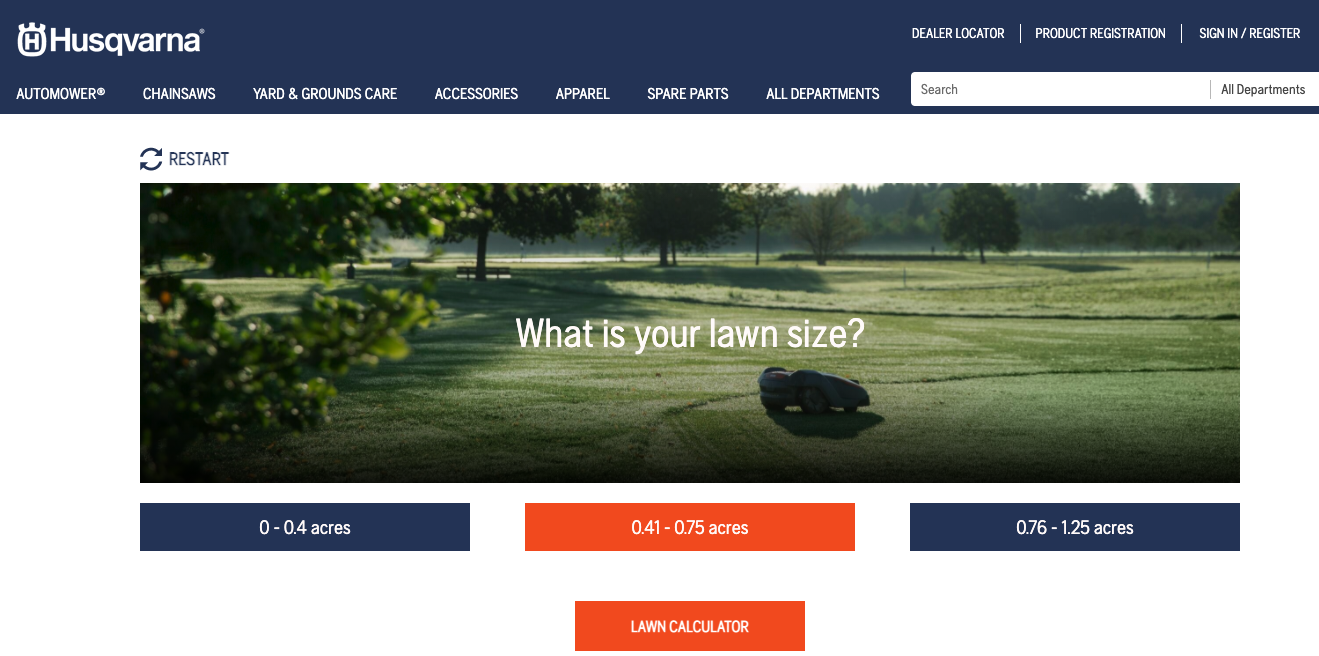
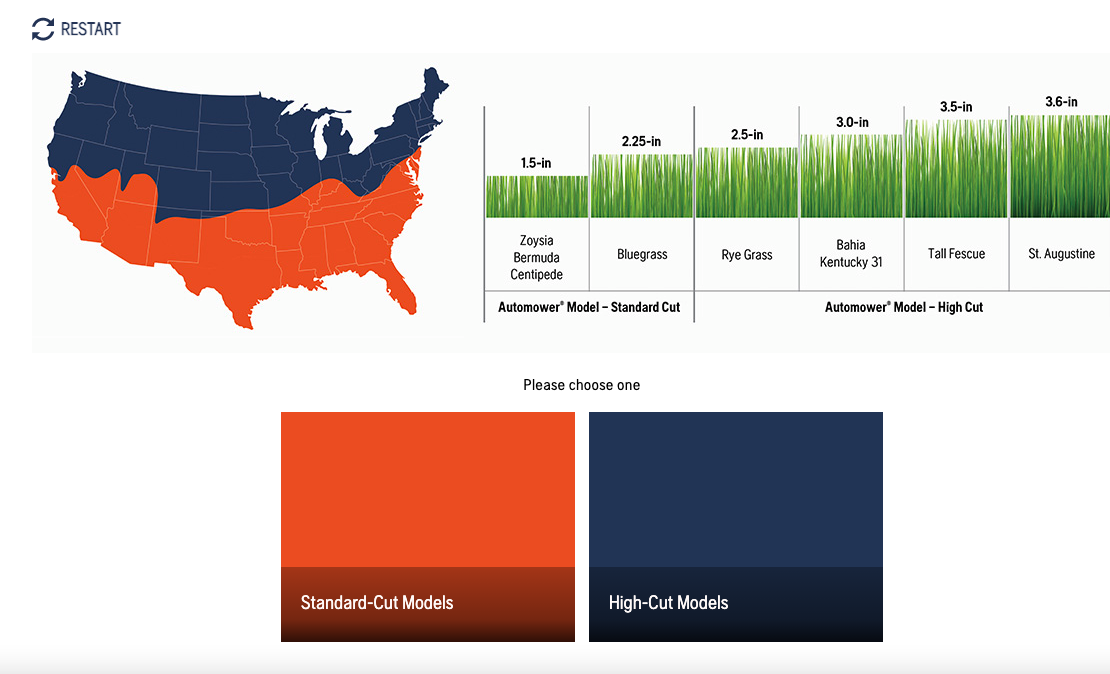
Product Quiz
As earlier mentioned, product quizzes are usually a series of questions about product preferences. Product quizzes don’t have conversations with users.
Typically, product quizzes aren’t supported by AI (artificial intelligence) and do not have machine learning and natural language processing (NLP) capabilities.
Many digitally native vertical brands leverage product quizzes for matching customers and are effective in providing simple product recommendations for a narrow product range.
An example of this type of strategy is Mount Lai’s skin tool and skincare brand who uses basic logic and rules for their stone guide.
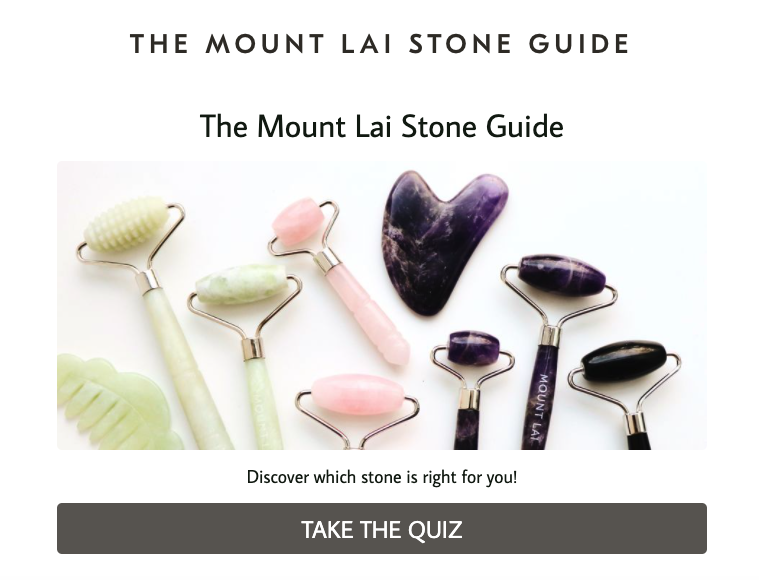
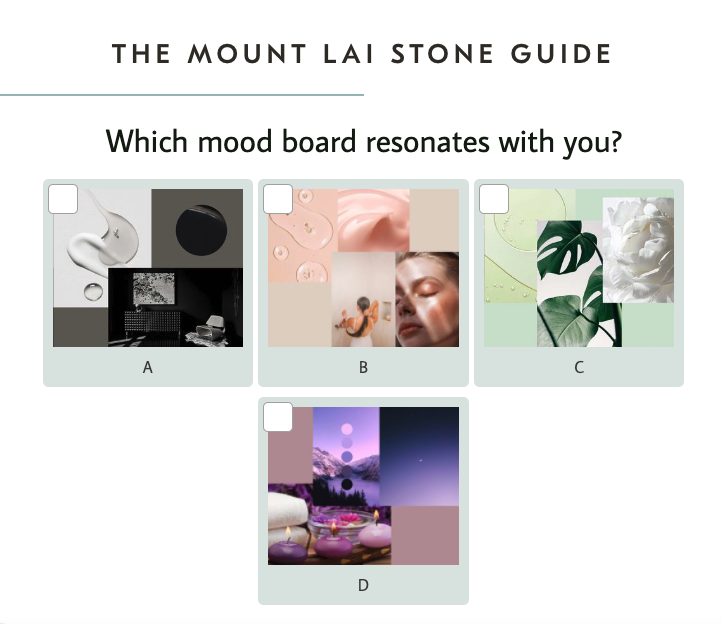
Customization Potential
Product finders and product quizzes differ in their customization potential.
Product Finders:
Product finders have recommendation logic which is why they are so powerful. Because AI usually powers product finders, they’re constantly learning. Product finders can also optimize in real-time, and adding new products isn’t a monumental task.
Product Quizzes:
Product quizzes tend to be hard-coded.
This technical aspect makes it difficult to make changes and add new products, using limited rule-based matching.
The result?
Product quizzes aren’t as flexible as product finders.
If one aspect changes, the product quiz may have t be re-designed from scratch. This can be a pain for most businesses.
Business Suitability
Product Finders:
Product finders are more suitable for larger eCommerce platforms due to the high traffic. Digital assistants can provide insights that product quizzes don’t.
Product Quizzes:
Product quizzes don’t have the capabilities product finders have. They’re primarily suitable for smaller eCommerce platforms.
Product Finders Vs. Product Quizzes: Which is Better?
Well, that’s complicated.

To determine which tool is ideal for your business, you need to know what you want.
If you want a tool that makes “smart Recommendations,” you should pick a product finder.
Why? Here are some benefits of digital assistants:
Provide better service to consumers.
Product finders enable consumers to find what they’re looking for faster while providing additional recommendations.
The result? A quicker path to product purchase and happier consumers.
Actionable Insights and proactive recommendations
Digital assistants give consumer insights that optimize future conversation flows. By connecting with customers in a personal way, product finders maximize results such as sales conversions.
Businesses can use these real-time insights to improve the user experience and learn about their customers continually.
Real-time reporting for Marketers.
Based on the insights provided, marketers can better understand various aspects such as which products are selling and why the best and worst-performing products, and other elements that influence sales conversions.
Build or Buy—The Million Dollar Question
Okay. So a product finder won’t cost you a million dollars, but getting the right tool could easily be worth a million dollars.
Making the correct choice could have a significant impact on your bottom line in the long run.
All successful brands explore their options—either building a customized in-house product recommendation finder or buying one.
The reality is that successful brands usually provide a fantastic customer experience to their buyers.
So, what does this take?
These brands have to be lean and agile. That means they have to be willing to change direction if their customers demand it.
With that context, building an in-house product finder would be cumbersome at best. This process would require additional resources. The recommendation logic and optimization of a product finder are complicated to maintain and improve without a platform.
On the other hand, buying a product finder enables eCommerce businesses to rely on providers for technical expertise, thus saving companies a significant headache.
Enhancing Ecommerce with Zoovu Digital Assistants
CRM and Marketing Enhancements with Zoovu
- Advanced CRM Integration: Integrate Zoovu’s digital assistants with CRM systems to capture zero-party data from engaging quizzes, enriching customer profiles and enabling more targeted marketing campaigns.
- Email Marketing and Lead Generation: Use insights gathered from digital assistant interactions to tailor email marketing campaigns, enhancing lead generation efforts and increasing the potential customer base.
- Google Analytics and Klaviyo Integration: Harness the power of Zoovu with Google Analytics and Klaviyo for detailed analysis of quiz results and user interactions, helping to refine marketing strategies and optimize overall performance.
Targeted Strategies for Industry-Specific Needs
- Skincare Industry Applications: Deploy digital assistants specifically designed to assess skin type and skincare needs, offering customized recommendations that enhance customer satisfaction and foster brand loyalty within skincare ecommerce brands.
- Subscription Services and Upselling: Incorporate conditional logic in Zoovu’s digital assistants to promote subscriptions and upsell opportunities, aligning recommended products with customer preferences and boosting average order value.
User Experience and Store Optimization
- Optimizing the Online Store: Use Zoovu to optimize ecommerce sites by implementing engaging quizzes that guide customers through their shopping journey, effectively using popups and targeted upsells on product pages to enhance the buying experience.
- Checkout and Conversion Rate Optimization: Design digital assistants that streamline the checkout process, utilizing customer data to pre-fill information and reduce friction, thereby improving conversion rates and customer satisfaction.
Engaging Digital Assistants for Shopify Integration
- Shopify and Ecommerce Integration: Leverage Zoovu’s advanced digital assistants to enhance the Shopify experience, seamlessly integrating personalized product recommendation quizzes that drive higher conversion rates and optimize the user experience.
- Personalized Product Recommendations: Utilize Zoovu’s technology to offer personalized product recommendations, helping customers find the right products quickly and efficiently, which is crucial in reducing cart abandonment and improving checkout completion rates.
Technical Integration and Customization
- Zapier Automation: Streamline workflows by connecting Zoovu digital assistants with other business tools via Zapier, facilitating automated data transfer and actions that enhance operational efficiency.
- WooCommerce Compatibility: Ensure that Zoovu’s digital assistants are fully compatible with WooCommerce, allowing for easy integration and functionality across different ecommerce platforms.
Design and Implementation of Effective Quizzes
- Quiz Maker and Builder Tools: Utilize Zoovu’s comprehensive quiz maker tools to create engaging and visually appealing digital assistants. Incorporate fonts, colors, and design templates that reflect the brand identity and resonate with the target audience.
- Shoppable Quiz Features: Design digital assistants that conclude with a shoppable results page, allowing quiz takers to easily purchase recommended products directly from the quiz interface, enhancing the seamless shopping experience.
- FAQs and Customer Support Integration: Include a section within the digital assistant that addresses frequently asked questions and offers immediate customer support to resolve issues and answer queries, further enhancing user experience.
Leveraging Social Media and Enhancing Visibility
- Social Media Integration: Promote digital assistants across social media platforms to engage a broader audience, utilizing engaging content and direct calls-to-action that drive traffic back to the online store and increase participation rates.
- Completion Rate and User Engagement Analytics: Monitor the completion rate and engagement levels of digital assistants using integrated analytics tools like Google Sheets, optimizing the quizzes continually to maintain high interaction levels and achieve desired outcomes.
By employing Zoovu’s digital assistants, ecommerce businesses can create a more personalized and efficient shopping experience that not only meets the expectations of modern consumers but also drives significant improvements in sales, customer retention, and overall market competitiveness.
Get in touch with Zoovu and let the experts help you.

